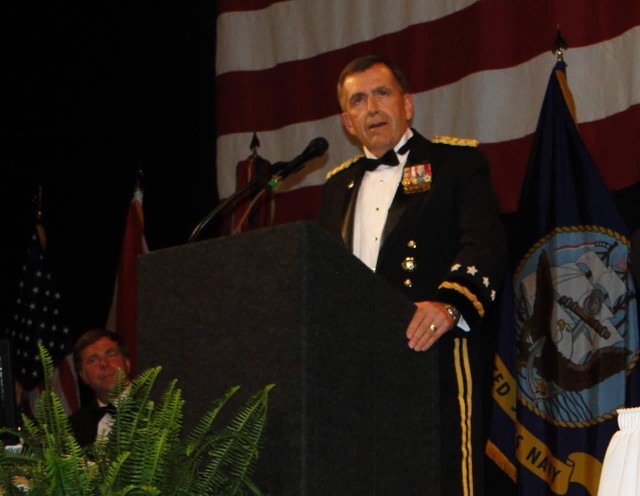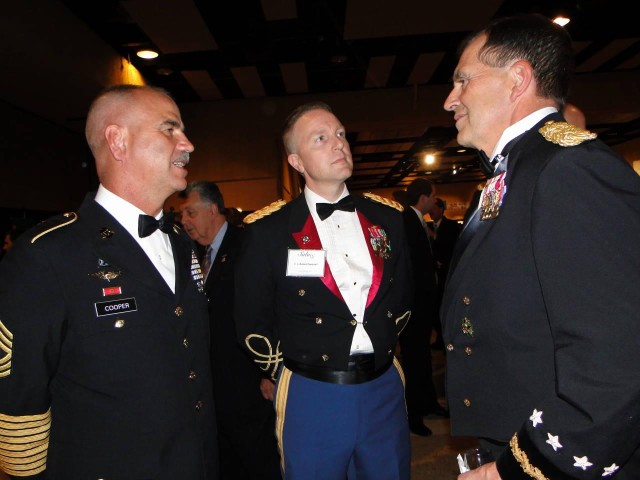Calling Redstone Arsenal and Huntsville "home to several of our nation's critical military operations," the Army's vice chief of staff thanked an audience of about 600 supporters of the Association of the U.S. Army "for what you do every single day for our Army."
Gen. Peter Chiarelli said Department of the Army civilians and contractors at Redstone Arsenal as well as the local research community are important in providing the "technology, tools and equipment" that Soldiers need to be successful on the battlefield. His comments were made June 17 during the Salute Dinner hosted by AUSA's Redstone-Huntsville chapter as part of the Armed Forces Celebration Week.
Combine the area's technological and scientific expertise with its southern hospitality and Huntsville "exemplifies what we mean when we say 'Army family.' You are at the heart of what defending the nation is all about," he said.
Prior to the dinner at the Von Braun Center, Chiarelli told local media he had an opportunity to drive around the city and the Arsenal and described what he saw as "absolutely fantastic."
"To see the construction and facilities here is amazing. I'm absolutely impressed," he said.
Commenting on Redstone Arsenal's "huge future," Chiarelli said the work of its employees is "absolutely essential to Soldiers."
Chiarelli, whose military decorations include the Bronze Star and Legion of Merit, is the 32nd vice chief of staff. His military career has included service at Fort Hood, Texas and throughout Europe as well as serving as director of operations, readiness and mobilization at Headquarters, Department of the Army. He served as commander of the 1st Cavalry Division at Fort Hood and in Iraq during the early days of Operation Iraqi Freedom. He has also commanded the Multi-National Corps in Iraq.
The Army family includes all Americans who have contributed to the defense of freedom, Chiarelli said, telling his audience that they "are important members of our extended Army family."
Chiarelli spent the Army's 234th birthday on June 14 at a ceremony at the Navy's historic U.S.S. Intrepid at Pier 86 in New York City. At first thought, a Soldier spending the Army's birthday on a Navy ship may seem out of the ordinary. But, he said, that, in fact, it was very appropriate.
"During World War II, the Intrepid transported thousands of GIs and tanks and airplanes and other equipment to the fight. It provided cover fire over numerous beaches," he said. "It represents our brothers and sisters in arms. We may wear different uniforms, and have separate and distinct missions, but when bullets fly we are one team. The Intrepid and its crew are an important part of the Army family."
He also spoke of veterans who have contributed to the Army's history, including Pfc. Humphrey Donahue who was killed in action in the Philippines in 1944. On the Army's birthday, Chiarelli presented Donahue's great-niece and her son with medals to replace their veteran's lost and destroyed medals.
"I could see in her face and hear in her words how much it meant to her," Chiarelli said. "She said 'These medals will be a part of our family forever.' She and her son and Private First Class Donahue are a part of our Army family forever."
Chiarelli recounted the birth of the U.S. Army in 1775. Its first battle -- the Battle of Bunker Hill on June 17, 1775 - is where U.S. victory "first demonstrated to the world that America's Army is a force to be reckoned with. And we have shown that countless times since then," he said.
Yet, Chiarelli said today's Army is "tired and stretched' with the demands of fighting two wars while at the same time contributing to an Army that is in transition.
"The battlefield is increasingly dynamic," he said. "Change happens in minutes. Soldiers at all levels bear a tremendous responsibility, and are required to show a maturity and strength never demanded of us ... They must take risks and come up with creative solutions on the battlefield."
Before the Army's transition, success was measured by how little risk had to be taken. Today, risk is focused at the brigade level and "game changing decisions are being made by Soldiers on the ground ... The environment that we operate in is extremely complex."
Because of the Army's high-stress demands, many of today's Soldiers are turning to alcohol and recreational drugs to escape. There is more depression, anxiety and post traumatic stress among Soldiers. And there are more suicides.
Today's Soldiers are experiencing many of the same issues faced by Soldiers of a previous generation, who, Chiarelli said, are represented by Sgt. Audie Murphy of World War II. Murphy admitted publicly of suffering from that era's version of post traumatic stress - known as battle fatigue - and using drugs to battle his depression.
"He broke the taboo of discussing war-related problems and became an advocate," Chiarelli said. "As important as winning the war is making sure we take care of Soldiers and their families."
The four-star general is heading a task force to address the increase in suicides among today's Soldiers. Last year, 141 active duty Soldiers committed suicide.
Admitting to his audience that the topic of suicide is a "dinner downer," Chiarelli said he "uses every opportunity I get to talk about this because we need to talk about it ... The mission has extended beyond suicide to include the overall well-being and mental health of Soldiers."
Chiarelli wants to ensure there is no stigma associated in the Army with asking and receiving help for mental health issues.
Yet, the general said the support and advocacy Soldiers received from DoD civilians and contractors, and from their communities will ensure the Army stays strong despite the challenges it faces today.




Social Sharing